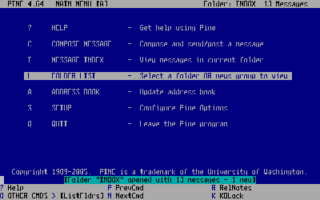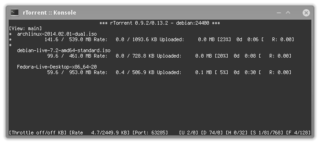The editor war is the rivalry between users of the Emacs and vi text editors. The rivalry has become an enduring part of hacker culture and the free software community.

GNU is an extensive collection of free software, which can be used as an operating system or can be used in parts with other operating systems. The use of the completed GNU tools led to the family of operating systems popularly known as Linux. Most of GNU is licensed under the GNU Project's own General Public License (GPL).
Pico is a text editor for Unix and Unix-like computer systems. It is integrated with Pine and Alpine, email clients initially designed by the Office of Computing and Communications at the University of Washington.

Pine is a freeware, text-based email client which was developed at the University of Washington. The first version was written in 1989, and announced to the public in March 1992. Source code was available for only the Unix version under a license written by the University of Washington. Pine is no longer under development, and has been replaced by the Alpine client, which is available under the Apache License.

Ghostscript is a suite of software based on an interpreter for Adobe Systems' PostScript and Portable Document Format (PDF) page description languages. Its main purposes are the rasterization or rendering of such page description language files, for the display or printing of document pages, and the conversion between PostScript and PDF files.
GNU Mach is an implementation of the Mach microkernel. It is the default microkernel in the GNU Hurd. GNU Mach runs on IA-32 machines. GNU Mach is maintained by developers on the GNU project. It is distributed under the terms of the GNU General Public License (GPL).

GNU Wget is a computer program that retrieves content from web servers. It is part of the GNU Project. Its name derives from "World Wide Web" and "get". It supports downloading via HTTP, HTTPS, and FTP.

Scanner Access Now Easy (SANE) is an open-source application programming interface (API) that provides standardized access to any raster image scanner hardware. The SANE API is public domain. It is commonly used on Linux.

GnuTLS is a free software implementation of the TLS, SSL and DTLS protocols. It offers an application programming interface (API) for applications to enable secure communication over the network transport layer, as well as interfaces to access X.509, PKCS #12, OpenPGP and other structures.
This article provides basic comparisons for notable text editors. More feature details for text editors are available from the Category of text editor features and from the individual products' articles. This article may not be up-to-date or necessarily all-inclusive.
GNU Readline is a software library that provides in-line editing and history capabilities for interactive programs with a command-line interface, such as Bash. It is currently maintained by Chet Ramey as part of the GNU Project.

JOE or Joe's Own Editor is an ncurses-based text editor for Unix systems, available under the GPL. It is designed to be easy to use.

rTorrent is a text-based BitTorrent client written in C++, based on the ncurses and libTorrent libraries for Unix, whose author's goal is "a focus on high performance and good code".

MicroEMACS is a small, portable Emacs-like text editor originally written by Dave Conroy in 1985, and further developed by Daniel M. Lawrence (1958–2010) and was maintained by him. MicroEMACS has been ported to many operating systems, including CP/M, MS-DOS, Microsoft Windows, VMS, Atari ST, AmigaOS, OS-9, NeXTSTEP, and various Unix-like operating systems.

GNU IceCat, formerly known as GNU IceWeasel, is a completely free version of the Mozilla Firefox web browser distributed by the GNU Project. It is compatible with Linux, Windows, Android and macOS.

Geany is a free and open-source lightweight GUI text editor using Scintilla and GTK, including basic IDE features. It is designed to have short load times, with limited dependency on separate packages or external libraries on Linux. It has been ported to a wide range of operating systems, such as BSD, Linux, macOS, Solaris and Windows. The Windows port lacks an embedded terminal window; also missing from the Windows version are the external development tools present under Unix, unless installed separately by the user. Among the supported programming languages and markup languages are C, C++, C#, Java, JavaScript, PHP, HTML, LaTeX, CSS, Python, Perl, Ruby, Pascal, Haskell, Erlang, Vala and many others.

GNU Emacs is a free software text editor. It was created by GNU Project founder Richard Stallman, based on the Emacs editor developed for Unix operating systems. GNU Emacs has been a central component of the GNU project and a flagship project of the free software movement. Its tag line is "the extensible self-documenting text editor."
Emacs, originally named EMACS, is a family of text editors that are characterized by their extensibility. The manual for the most widely used variant, GNU Emacs, describes it as "the extensible, customizable, self-documenting, real-time display editor". Development of the first Emacs began in the mid-1970s, and work on GNU Emacs, directly descended from the original, is ongoing; its latest version is 29.2, released January 2024.

Uzbl is a discontinued free and open-source minimalist web browser designed for simplicity and adherence to the Unix philosophy. Development began in early 2009 and is still considered in alpha software by the developers. The core component of Uzbl is written in C, but other languages are also used, most notably Python. All parts of the Uzbl project are released as free software under GNU GPL-3.0-only.

Spacemacs is a configuration framework for GNU Emacs. It can take advantage of all of GNU Emacs' features, including both graphical and command-line user interfaces, and being executable under X Window System and within a Unix shell terminal. It is free and open-source software (FOSS) released under the GPL-3.0-or-later license.














